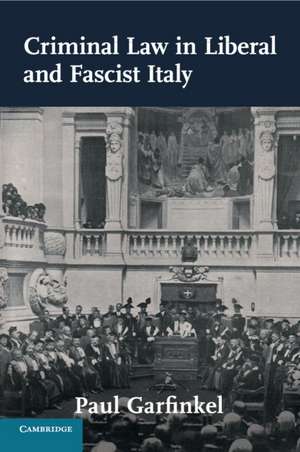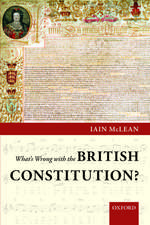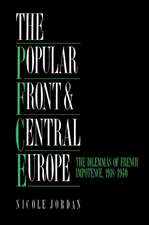Criminal Law in Liberal and Fascist Italy: Studies in Legal History
Autor Paul Garfinkelen Limba Engleză Paperback – 15 mai 2019
| Toate formatele și edițiile | Preț | Express |
|---|---|---|
| Paperback (1) | 422.02 lei 6-8 săpt. | |
| Cambridge University Press – 15 mai 2019 | 422.02 lei 6-8 săpt. | |
| Hardback (1) | 663.44 lei 3-5 săpt. | |
| Cambridge University Press – 8 ian 2017 | 663.44 lei 3-5 săpt. |
Din seria Studies in Legal History
-
 Preț: 494.74 lei
Preț: 494.74 lei - 11%
 Preț: 692.50 lei
Preț: 692.50 lei -
 Preț: 373.86 lei
Preț: 373.86 lei -
 Preț: 187.82 lei
Preț: 187.82 lei -
 Preț: 424.34 lei
Preț: 424.34 lei -
 Preț: 199.96 lei
Preț: 199.96 lei -
 Preț: 192.94 lei
Preț: 192.94 lei -
 Preț: 200.36 lei
Preț: 200.36 lei -
 Preț: 233.69 lei
Preț: 233.69 lei - 9%
 Preț: 664.00 lei
Preț: 664.00 lei -
 Preț: 376.31 lei
Preț: 376.31 lei -
 Preț: 488.22 lei
Preț: 488.22 lei -
 Preț: 492.83 lei
Preț: 492.83 lei -
 Preț: 202.53 lei
Preț: 202.53 lei -
 Preț: 126.60 lei
Preț: 126.60 lei -
 Preț: 484.56 lei
Preț: 484.56 lei -
 Preț: 180.87 lei
Preț: 180.87 lei -
 Preț: 373.92 lei
Preț: 373.92 lei -
 Preț: 114.42 lei
Preț: 114.42 lei -
 Preț: 233.26 lei
Preț: 233.26 lei -
 Preț: 237.74 lei
Preț: 237.74 lei -
 Preț: 419.97 lei
Preț: 419.97 lei -
 Preț: 301.82 lei
Preț: 301.82 lei -
 Preț: 315.02 lei
Preț: 315.02 lei - 14%
 Preț: 793.30 lei
Preț: 793.30 lei -
 Preț: 321.90 lei
Preț: 321.90 lei -
 Preț: 308.45 lei
Preț: 308.45 lei -
 Preț: 411.48 lei
Preț: 411.48 lei - 11%
 Preț: 697.28 lei
Preț: 697.28 lei -
 Preț: 441.43 lei
Preț: 441.43 lei -
 Preț: 434.89 lei
Preț: 434.89 lei -
 Preț: 430.17 lei
Preț: 430.17 lei -
 Preț: 307.68 lei
Preț: 307.68 lei -
 Preț: 246.40 lei
Preț: 246.40 lei -
 Preț: 427.04 lei
Preț: 427.04 lei - 14%
 Preț: 755.02 lei
Preț: 755.02 lei -
 Preț: 302.89 lei
Preț: 302.89 lei -
 Preț: 305.39 lei
Preț: 305.39 lei - 14%
 Preț: 696.96 lei
Preț: 696.96 lei -
 Preț: 314.81 lei
Preț: 314.81 lei - 11%
 Preț: 694.23 lei
Preț: 694.23 lei
Preț: 422.02 lei
Nou
Puncte Express: 633
Preț estimativ în valută:
80.76€ • 84.01$ • 66.68£
80.76€ • 84.01$ • 66.68£
Carte tipărită la comandă
Livrare economică 14-28 aprilie
Preluare comenzi: 021 569.72.76
Specificații
ISBN-13: 9781107520141
ISBN-10: 1107520142
Pagini: 554
Dimensiuni: 153 x 230 x 35 mm
Greutate: 0.81 kg
Editura: Cambridge University Press
Colecția Cambridge University Press
Seria Studies in Legal History
Locul publicării:New York, United States
ISBN-10: 1107520142
Pagini: 554
Dimensiuni: 153 x 230 x 35 mm
Greutate: 0.81 kg
Editura: Cambridge University Press
Colecția Cambridge University Press
Seria Studies in Legal History
Locul publicării:New York, United States
Cuprins
1. Body count; 2. Civilized violence; 3. Force of habit; 4. Tomorrow's criminals; 5. Grapes and wrath; 6. Coup, casualty and catalyst: the Ferri Code, 1919–25; 7. Fascism's legal Risorgimento, 1925–31; Conclusion.
Recenzii
'Professor Garfinkel's book is one of those rare works of original scholarship that succeeds in covering both the Liberal and Fascist eras in Italian history at the national level. By concentrating on common crime rather than political crimes, he has developed an extremely original thesis that challenges the established interpretations of jurisprudence in the nineteenth and twentieth centuries.' Anthony Cardoza, Loyola University, Chicago
'Paul Garfinkel's vivid account of the development of Italian criminal justice from the perspective of prominent criminal law practitioners relies on a stunning array of sources to craft a convincing argument. An insightful contribution to the study of European law and society, the book offers an important counterpoint to prevailing historiography.' Maura Hametz, Old Dominion University, Virginia
'Eloquently written, and with a welcome focus on the treatment of ordinary rather than political crime, Garfinkel's ground-breaking book persuasively challenges scholarly understandings of the ideas and debates inspiring penal reform in Liberal Italy and the first decade of Mussolini's fascist regime.' Jonathan Dunnage, Swansea University
'This elegantly written and widely researched study of criminal law in liberal and fascist Italy challenges the widely accepted view that Italy's 1930 criminal law code was fascist, positivist and anti-liberal in inspiration. Engaging with the wider debates on the relationship between liberalism and fascism, Paul Garfinkel's conclusions will attract the attention of scholars in many different fields.' John Davis, University of Connecticut
'Paul Garfinkel's vivid account of the development of Italian criminal justice from the perspective of prominent criminal law practitioners relies on a stunning array of sources to craft a convincing argument. An insightful contribution to the study of European law and society, the book offers an important counterpoint to prevailing historiography.' Maura Hametz, Old Dominion University, Virginia
'Eloquently written, and with a welcome focus on the treatment of ordinary rather than political crime, Garfinkel's ground-breaking book persuasively challenges scholarly understandings of the ideas and debates inspiring penal reform in Liberal Italy and the first decade of Mussolini's fascist regime.' Jonathan Dunnage, Swansea University
'This elegantly written and widely researched study of criminal law in liberal and fascist Italy challenges the widely accepted view that Italy's 1930 criminal law code was fascist, positivist and anti-liberal in inspiration. Engaging with the wider debates on the relationship between liberalism and fascism, Paul Garfinkel's conclusions will attract the attention of scholars in many different fields.' John Davis, University of Connecticut
Notă biografică
Descriere
The author explains the sustained and wide-ranging interest in penal-law reform that defined this era in Italian legal history.

















